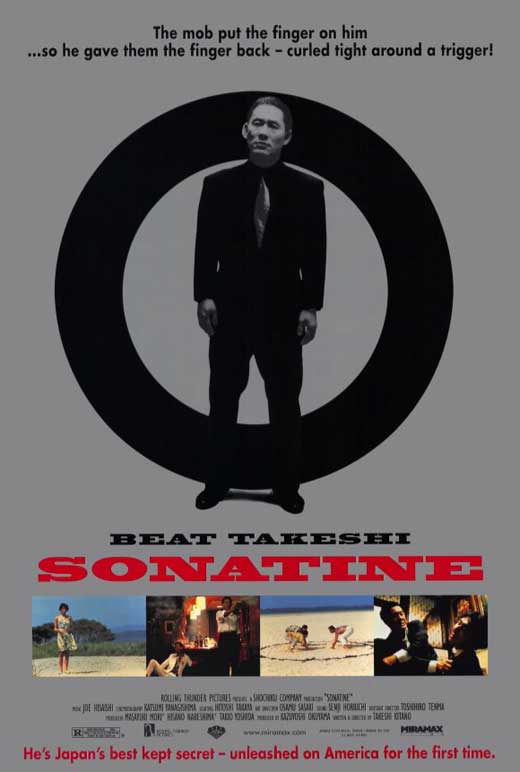So it’s taken me awhile to get back into doing solo reviews. It’s not my fault, it’s HBOGO’s and Netflix’s fault. Here I am, trying to get back into The Wire so Dylan will stop sending me death threats, and I “accidently” start The Walking Dead. And then I noticed Rome and you can’t say no to that. Ever. So needless to say, the threats haven’t stopped. But coming out of my zombie and oddly British Roman haze, I realized I had to do something.
So thought you might like a review on something new. Well I thought about that and then I noticed that that Kitano film sitting in my que on Netflix, and it looked so lonely. So for now, I’m continuing my incredibly slow moving campaign of reviewing his films. My first one, Outrage, was one of his recent films, so now I’m going all the way back to the pre-enlightened age of 1993 to bring you one of his earliest and successful films.
Netfilx: I already answered this
Viewer: Maniac McMark |
| Greatest. Tagline. Ever. |
So, much like Outrage, Kitano brings us into the life of an aged Yakuza who has been living this life for quite a while. And quite successfully, as we hear from his bosses. And yet, that is the biggest problem. Not for the film, but for the story. Aniki Murakawa, Kitano’s character, has been doing so well controlling his clan and his territory, that it’s become the jewel of the Yakuza. And the big boss wants it for himself. But you can’t just off one of your best men, oh no, that would cause too many problems. So obviously the sensible thing to do is send him and his men to deal with the rising tensions between two smaller clans, The Nakamatsu and Anan, in Okinawa. But unlike most gangster films, Murakawa doesn’t just agree and walk blindly into an obvious trap. He’s too old for this shit and knows right off the bat that this is probably a plot to kill him. But without evidence, though not without trying to get some, he has to go with his men. And against type again, things go swimmingly for him and his men.
Are you kidding? Of course not. And after a slow start, we see the violence that Kitano is famous for; quick, brutal and joyless. No build up, no musical cue that things are about to go sideways, just a sudden burst of bullets and blood. Unlike most films, the violence in his films is never glorified, it looks as painful as it would be in real life.
Though, in a way I always find strange with his films, no one moves when the bullets let fly. Apparently this is no time for dramatics or diving into cover, this isn’t John Woo film. No, they stand stock still with stoic faces, firing until one side is dead. it’s just so strange from what we’re used to in films, what with no action but shooting and absolutely no joy to be had in the moment for us or them. I always find his stark depiction of the yakuza life refreshing from most crime films. And in this film, after the violence blows over, we’re left with only a handful of members, and surprisingly a lot of time left. And this is when things become interesting, in a very bizarre kind of way.
As Murakawa and his men wait in hiding for the violence to subside, we watch as they become more at ease with everything. They’re at the seaside, they’re playing games, Murakawa is playing tricks on people, and everything feels fine. It’s like were made to see that these are men of violence, but only violent when they have to be. Other than that, they are no different from you or me. Kitano is trying to show us this, but it’s such a sudden left turn from what the movie had been, that it takes awhile to get used to it. I won’t say it wasn’t fun watching the two younger guys play “shoot the can off my head with live rounds” and throw friendly insults at each other, but the films comes to a crawl during these parts. Basically it’s a time for the older characters to share some wisdom, usually through incredibly weird and tense ways. And yet, as we get used to this seemingly out of place second act, the violence comes roaring back, and as the third act comes to a close, we’ve witnessed more violence and bloodshed than you’d ever think would happen in this.
It’s a subversive Yakuza film; it’s not here to satiate your need for violence, but it gives you that violence anyway but a lesson along for the ride. That these are all people, with thoughts and personalities. And sometimes circumstances arise that force us to be violent, for “justice” or self preservation. It’s not for everyone, what with the whole suddenly turning into a trip to the beach with the yakuza family in the middle. And it is slow, lingering on shots of character just standing and staring. It looks beautiful, which helps to make those scenes bearable. It’s the story of an old man of violence and wisdom whose organization, that he’s given so much too, now sees him doing more for them dead than alive. And he completely disagrees. He just might get distracted by fun in the sun before getting around to them though.
No comments:
Post a Comment